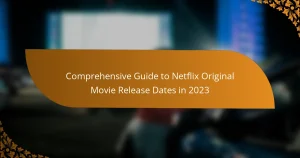
What are the Release Dates for Popular TV Series Reboots?
It is not possible to provide a comprehensive list of release dates for popular TV series reboots. The release dates vary widely across different series and networks. Additionally, new reboots are announced frequently, making it challenging to keep an updated record. For accurate information, it is best to consult reliable entertainment news sources or official announcements from networks.
How do release dates impact viewer anticipation?
Release dates significantly influence viewer anticipation for TV series reboots. A well-timed release date can build excitement and engagement. For instance, strategic scheduling around holidays or popular events can enhance visibility. Research shows that anticipation peaks when release dates are announced months in advance. This allows fans to discuss and speculate, increasing buzz. Additionally, countdowns and promotional activities leading up to the release can amplify viewer interest. Historical data indicates that shows with longer promotional periods often enjoy higher viewership on premiere night. Thus, release dates are crucial in shaping audience expectations and engagement levels.
What factors influence the scheduling of reboot releases?
Factors influencing the scheduling of reboot releases include market demand, production timelines, and audience engagement strategies. Market demand is assessed through viewer interest and nostalgia for the original series. Production timelines involve the time required for scripting, filming, and post-production. Audience engagement strategies include timing releases to coincide with significant cultural events or trends. Additionally, network competition can affect scheduling decisions, as networks seek to maximize viewership. Historical data indicates that successful reboots often align with these factors to optimize audience reach. For instance, the reboot of “Will & Grace” capitalized on nostalgia and was strategically timed for maximum impact.
How do networks announce release dates for reboots?
Networks announce release dates for reboots through various channels. They typically utilize press releases to inform media outlets. Social media platforms are also employed to reach a wider audience quickly. Promotional trailers often include release dates to generate excitement. Television networks may announce dates during industry events like Comic-Con. Additionally, official websites provide updates directly to fans. These methods ensure that information is disseminated effectively. For example, the reboot of “Will & Grace” was announced via a press release and social media posts. This multi-channel approach maximizes visibility and engagement.
Which popular TV series have been rebooted recently?
Popular TV series that have been rebooted recently include “Charmed,” “Roswell,” and “The Wonder Years.” “Charmed” was rebooted in 2018, bringing a new generation of witches to the screen. “Roswell, New Mexico” premiered in 2019, reimagining the original “Roswell” series from the early 2000s. “The Wonder Years” reboot debuted in 2021, offering a fresh perspective on the classic coming-of-age story. These reboots have attracted both old fans and new viewers, generating significant discussions and reactions online.
What are the most notable reboots in the last decade?
Notable reboots in the last decade include “Gilmore Girls: A Year in the Life,” “Fuller House,” and “Roseanne.” “Gilmore Girls” returned in 2016, reviving the beloved series with four new episodes. “Fuller House,” a sequel to “Full House,” premiered in 2016 and ran for five seasons. “Roseanne” was rebooted in 2018, bringing back the original cast for a revival season. Each reboot garnered significant attention and mixed fan reactions. These series reflect the trend of nostalgia-driven television programming.
How do these reboots compare to their original versions?
Reboots often differ significantly from their original versions in terms of storytelling and character development. Many reboots update themes to reflect contemporary societal issues. Original versions may have been limited by the cultural context of their time. Reboots frequently employ modern technology and production techniques, enhancing visual quality. Fan reactions vary widely; some appreciate the fresh take, while others prefer the nostalgia of the original. For example, the reboot of “Fuller House” received mixed reviews compared to “Full House,” with some fans enjoying the nostalgia and others criticizing the writing. Overall, reboots aim to attract new audiences while retaining elements familiar to long-time fans.

What are Fan Reactions to TV Series Reboots?
Fan reactions to TV series reboots are often mixed. Some fans express excitement about the return of beloved characters and stories. Others voice skepticism, fearing that reboots may not capture the original’s essence. Social media platforms amplify these reactions, showcasing both enthusiasm and criticism. For example, reboots like “Fuller House” and “The X-Files” received significant attention, with fans sharing their thoughts widely. Additionally, studies show that nostalgia plays a crucial role in fan reactions, influencing their expectations. Ultimately, fan reactions vary based on personal attachment to the original series and the quality of the reboot.
How do fans express their opinions about reboots?
Fans express their opinions about reboots through various channels. They often use social media platforms to share their thoughts. Twitter, Facebook, and Instagram are popular for immediate reactions. Fans may create hashtags to rally support or criticize reboots. Online forums and fan sites also serve as discussion hubs. Reviews on platforms like Rotten Tomatoes and IMDb reflect fan sentiments. Fan art and videos can showcase their feelings about reboots. Additionally, petitions may emerge to influence production decisions. These expressions highlight the strong connection between fans and the content they love.
What platforms do fans use to share their reactions?
Fans use social media platforms to share their reactions. Popular platforms include Twitter, Facebook, and Instagram. On Twitter, fans utilize hashtags to join conversations. Facebook groups allow for in-depth discussions among fan communities. Instagram is used for visual content, like memes and screenshots. TikTok has gained popularity for short reaction videos. Reddit hosts dedicated threads for episode discussions. These platforms facilitate immediate feedback and engagement with other fans.
How do fan reactions differ across various demographics?
Fan reactions differ significantly across various demographics. Age, gender, and cultural background influence how fans engage with series reboots. Younger audiences often express their reactions through social media platforms. They tend to favor instant feedback and viral trends. In contrast, older demographics may prefer traditional media for expressing opinions. Gender also plays a role; studies show that male fans may focus on action and plot while female fans often emphasize character development. Cultural background can further shape reactions, as different cultures may have unique expectations for storytelling and representation. Research indicates that diverse demographics lead to a wide range of opinions and engagement styles. For instance, a study by the Pew Research Center found that younger viewers are more likely to participate in online discussions about TV shows.
What are common themes in fan reactions to reboots?
Common themes in fan reactions to reboots include nostalgia, skepticism, and disappointment. Fans often express nostalgia for the original series, highlighting their emotional connections. Skepticism arises regarding the reboot’s ability to capture the essence of the original. Disappointment frequently occurs when reboots fail to meet expectations or alter beloved characters. Additionally, fans may celebrate modern updates that enhance storytelling or representation. Criticism often targets changes in tone or direction that diverge from the original. Overall, reactions reflect a blend of hope and concern for the integrity of the source material.
Why do some fans embrace reboots while others resist them?
Some fans embrace reboots for nostalgia and the opportunity to experience beloved stories anew. They appreciate updated visuals and modern storytelling techniques. For example, reboots can introduce younger audiences to original content. This can lead to increased fan engagement and merchandise sales.
Conversely, some fans resist reboots due to attachment to the original work. They may perceive reboots as unnecessary or inferior. Fans often express concerns about changes to character development or plotlines. This resistance can stem from a fear of losing the essence of the original series.
Overall, the mixed reactions to reboots reflect a balance between nostalgia and the desire for innovation in storytelling.
How do critical reviews align with fan reactions?
Critical reviews often reflect a more analytical perspective compared to fan reactions. Critics evaluate elements like writing, direction, and production quality. Fans typically focus on emotional connections and nostalgia. Despite differing focuses, trends show alignment in overall sentiment. For instance, a highly-rated reboot may receive positive reactions from fans. Conversely, a poorly received reboot often sees negative feedback from both critics and fans. This correlation can be observed in various series, such as the recent reboot of “The X-Files.” Both critics and fans expressed disappointment in its execution. Thus, while perspectives differ, critical reviews and fan reactions frequently align on general approval or disapproval.

How do Release Dates and Fan Reactions Interact?
Release dates significantly influence fan reactions. Fans often express excitement or disappointment based on the timing of a release. For example, a surprise early release can generate immediate positive buzz. Conversely, delays may lead to frustration and negative feedback. Social media amplifies these reactions, allowing fans to share their opinions widely. Historical data shows that well-timed releases can boost viewership significantly. For instance, the release of a series during a holiday often correlates with higher engagement. Overall, the interplay between release dates and fan reactions shapes the success of TV series reboots.
What impact do release dates have on fan expectations?
Release dates significantly shape fan expectations. Fans often associate specific dates with the anticipation of new content. A well-publicized release date can heighten excitement and engagement. Conversely, delays can lead to disappointment and frustration among fans. Research indicates that consistent communication about release dates can enhance trust between creators and audiences. For instance, a survey by The NPD Group found that 67% of fans feel more connected to a series when release dates are announced early. Thus, the timing and clarity of release dates are crucial in managing fan expectations.
How do early release announcements affect fan engagement?
Early release announcements significantly increase fan engagement. Fans often feel a heightened sense of excitement and anticipation. This can lead to increased social media activity, including sharing, commenting, and discussing the upcoming release. According to a study by the Journal of Media Psychology, early announcements can boost online interactions by up to 40%. This engagement often translates into higher viewership numbers upon release. Additionally, early announcements can foster a sense of community among fans as they connect over shared enthusiasm. Overall, the timing of release announcements plays a crucial role in shaping fan dynamics.
What role do trailers play in shaping fan reactions prior to release?
Trailers play a critical role in shaping fan reactions prior to release. They serve as promotional tools that create anticipation and excitement. Trailers highlight key elements such as plot, characters, and visual style. This information influences fan expectations significantly. Research indicates that engaging trailers can lead to increased social media discussions. For instance, a study by The Hollywood Reporter found that trailers for popular series can boost viewer interest by up to 40%. Additionally, trailers often set the tone for the series, impacting fan perceptions. Effective trailers can generate buzz and speculation, further enhancing fan engagement.
What can be learned from fan reactions to improve future reboots?
Fan reactions provide valuable insights for improving future reboots. Understanding what fans appreciate can guide creators in aligning with audience expectations. For example, positive feedback often highlights character development and fidelity to original storylines. Negative reactions frequently indicate dissatisfaction with changes to beloved elements. Analyzing social media trends reveals specific aspects that resonate with viewers. Engagement metrics can show which elements generate excitement or disappointment. Ultimately, listening to fan feedback can enhance the quality and reception of future reboots. This approach has been effective in past reboots, such as “Star Trek” and “Battlestar Galactica,” where fan input significantly shaped the direction of the series.
How can showrunners incorporate fan feedback into reboot development?
Showrunners can incorporate fan feedback into reboot development by actively engaging with the audience through surveys and social media. This allows them to gather insights on viewer preferences and expectations. Analyzing trends in fan discussions helps identify key themes and elements that resonate with the audience. Additionally, showrunners can host focus groups to discuss specific aspects of the reboot. This direct interaction provides valuable qualitative data. Incorporating fan suggestions into the storyline or character development can enhance viewer satisfaction. Historical examples, such as the revival of “Will & Grace,” show that responding to fan feedback can lead to increased viewership and positive reception.
What best practices can be established for engaging fans during reboot production?
Engaging fans during reboot production can be effectively achieved through several best practices. First, maintaining transparent communication is crucial. Regular updates about the production process can create excitement and anticipation. Second, involving fans in decision-making, such as casting or storyline polls, fosters a sense of ownership. Third, utilizing social media platforms for behind-the-scenes content can enhance fan connection. Fourth, organizing fan events or virtual meet-and-greets can build community and engagement. Fifth, leveraging nostalgia through callbacks to the original series can resonate with long-time fans. These practices have been successful in previous reboots, such as “Will & Grace” and “The X-Files,” where fan involvement significantly increased viewer interest and loyalty.
The article focuses on release dates for popular TV series reboots and the corresponding fan reactions. It highlights the impact of release dates on viewer anticipation, factors influencing scheduling, and methods networks use to announce these dates. Additionally, the article examines recent reboots, notable examples from the last decade, and how fan reactions vary across demographics. It also discusses the interplay between release dates and fan expectations, the role of trailers, and best practices for engaging fans during reboot production, emphasizing the importance of incorporating fan feedback into future developments.


